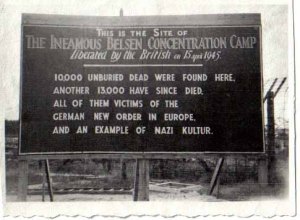Today, 15th April, marks the 71st anniversary of the liberation of the Bergen-Belsen concentration camp by British troops. This time last year, I was honoured to be a part of the Holocaust Educational Trust’s delegation to the commemorative services at Bergen-Belsen and the Bergen-Hohne Army Garrison which marked the 70th anniversary.

But 71 is no less significant than 70. It’s not necessary to have some sort of round or important number for such an anniversary to be noteworthy; what it represents is important regardless of how many years ago it happened.

The liberation of Bergen-Belsen by the 11th Armoured Division of the British Army shaped and defined Britain’s relationship with the Holocaust. British people were directly affected by the Holocaust when they arrived at Belsen and faced the sight of unburied bodies, emaciated people and widespread disease. Certainly, when speaking at the Holocaust Educational Trust’s Ambassador Conference last year, Bernard Levy explained that what he saw at the age of just 19 has “strangled [him] for all these years”.
Furthermore, the liberation of Bergen-Belsen is also a poignant reminder that for many, liberation did not necessarily equal freedom. Despite liberation by the British army on 15th April 1945, many of those in the concentration camp still subsequently died as a result of starvation, poor living conditions and prevalent disease. Similarly, following liberation, many of the victims of the camp had neither homes or families to return to and found themselves living in displaced persons camps for many years.
Undoubtedly, the Holocaust is incredibly relevant to society today as it epitomises the very best and very worst of humanity and offers some very important lessons. Anniversaries such as this one are especially significant as they provide us with an opportunity to reflect on the Holocaust and think about its contemporary relevance.
